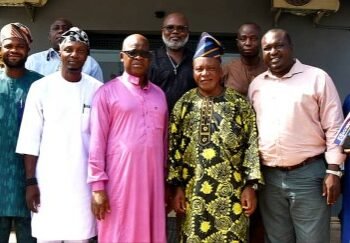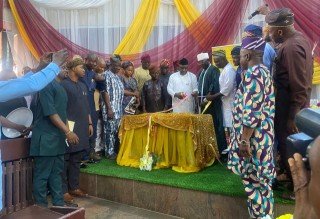Professor Grace Oloukoi of Lead City University (LCU), Ibadan and 15 other institutions across Africa have secured a CAD $5million (approximately US $4million) grant for the Climate Adaptation Resilience (CLARE) Project.
Oloukoi, the Dean of the Faculty of Environmental Design and Management, LCU, disclosed this while addressing a press conference on the project.
The professor of Urban Planning and Environmental Management further said, out of the CAD $5 million, she successfully secured CAD $325,876 grant for LCU to participate in the research collaboration.
According to her, the CAD $325,876 is a sub-contract of the project, titled “A Pan-African and Trans-disciplinary Lens on the Margins: Tackling the Risks of Extreme Events (PALM-TREEs)”.
Professor Oloukoi said: ‘’PALM-TREEs, a project worth 5,370, 300 Canadian dollars, is one of the Climate Adaptation and Resilience (CLARE), a UK-Canada framework research programme mainly funded by the UK’s Foreign, Commonwealth and Development Office (UK-FCDO) and the International Development Research Centre (IDRC).
‘’PALM-TREEs is being implemented in six countries: Nigeria, South Africa, Ghana, Cameroon, Kenya and DR Congo -involving 16 institutions across Africa and the United Kingdom, with the University of Cape Town as the lead organisation where the Project Consortium Office domiciles, under the leadership of Professor Abiodun Babatunde.
‘’Other partners include the International Water Management Institute (IWMI), Lead City University, University of Lagos, University of Oxford, UK Met Office, University of Nairobi, Kwame University of Science and Technology, the Nigerian Institute for Social Economic Research (NISER) and University of Yaoundé.
‘’The project emphasises lived experiences methodology and the dynamics of indigenous knowledge to understand the dimensions of climate risks based on the complex social identities of the margins in local communities and to ensure inclusive adaptation policies in Africa.’’
Oloukoi said she is working in Nigeria, with Professor Mayowa Fasona of the University of Lagos and Professor Andrew Onwuemele of the Nigerian Institute for Social and Economic Research (NISER), Ibadan.
Oloukoi is also serving as the Focal Lead for Gender and Social Inclusion for the PALM-TREEs project across Africa.
According to her, the climate research project is focusing on Lagos as a city-scale study on flooding and heat waves, and the Middle Belt as a regional-scale study on agricultural drought and flooding.
‘’The project will deconstruct the dimensions of impacts of these extremes on livability, livelihoods and well-being of the margins.
“The margins are the vulnerable -the population groups that lack representation or voice in climate adaptation discourse. These include the homeless, aged, children, women, immigrants and the physically challenged.
“The project also provides opportunities for Early Career Scientists (ECS) who are being supported for their doctoral and post-doctoral research.

‘’The inter-connected work packages for the PALM-TREEs project are: social impacts of climate extremes, physical drivers of extreme events, climate-resilient solutions and capacity strengthening.’’
She further stated that the specific outputs of the project include reduced barriers to sustainable knowledge networks, more equitable relationships between communities, practitioners, policy makers and researchers, transferable methodology to deal with multidimensional compounds of extreme events and sustainable change, based on nature-based adaptation strategies.
Oloukoi said the Nigerian experiences would be approached through the understanding of the multiple drivers and risks of extreme events, capturing lived experiences, policy dialogue and social inclusion.
The expected results, she added, include adaptation and resilience, co-production of knowledges, empowerment for social change and sustainable human and ecology systems.
‘’The project implementation has commenced and this will run for 42 months, till January, 2027. Inception meetings were already held at Lagos and Ilorin as parts of Stakeholders’ Engagement and Community Entry strategies.
“During the meetings, the media, the communities, government agencies, non-state actors, knowledge brokers and scientists brainstormed to harvest ideas for the actualisation of PALM-TREEs project in Nigeria.
“LCU is providing institutional support for the implementation of the project. This scholarship milestone will foster the global visibility of faculty members of LCU, Nigeria,’’ she added.
Oloukoi further said: “The head where the consortium project office is at the University of Cape Town under the leadership of Professor Abiodun Babatunde.
“Today in research, we come together to build a consortium. Time has gone where an individual will be writing a proposal.
“In Nigeria, there are three institutions- Lead City University, University of Lagos and NISER. Across Africa, there are 16 institutions and we still have three other institutions from UK joining us.
“For instance, in Ghana, we have Kwame University of Science and Technology. In Cameron, we have University of Yaounde. Also in the UK, we have UK Water Office, UK Hydrology Institute. These are the institutions coming together, but LCU is participating in this project as a sub-contractor, in which I won the grant.
“Based on the papers we signed with the donor, the project commenced in May 2023, but the implementation started in April 2024.
“LCU is providing the enabling environment for the researchers. I lead the team for Nigeria, and in terms of the whole Pan African project, I am the Lead Focal for the Gender Equity and Social Inclusion aspect of the project.
“In Nigeria, there are two spaces we are looking at, we have the city scale like Lagos which is a cosmopolitan setting, as we have rural Lagos and Urban Lagos.
“In terms of regional scale, we are looking at Middle Belt of Nigeria. When you look at the map of Nigeria, it captures Kwara, Kogi, Niger and Taraba states.
“We will be focusing more on agricultural grounds and definitely, that will capture people in the rural area,” Professor Oloukoi added.






























